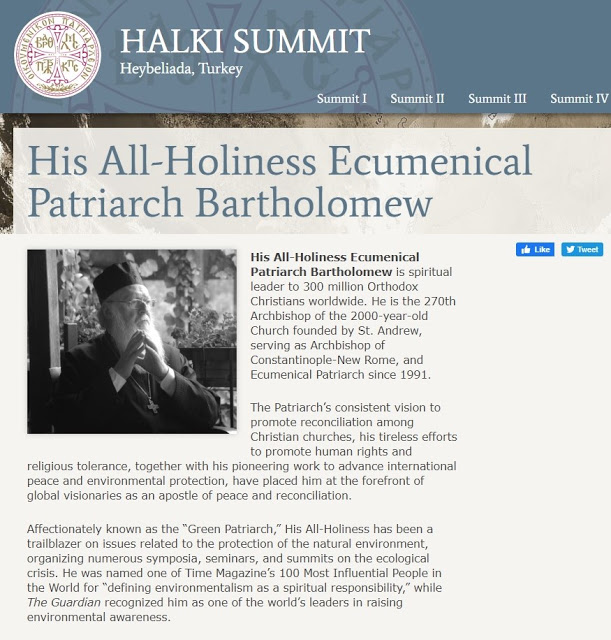
Keynote Address by His All-Holiness Ecumenical Patriarch Bartholomew
Opening Webinar of Halki Summit IV
January 26, 2021
* * *
Beloved friends and dear listeners,
Distinguished speakers, guests, and participants,
It is a special privilege to welcome you to this opening webinar of our Halki Summit, which marks the fourth in a series on environmental responsibility and sustainability.
These summits follow a long tradition of almost three decades. They are named after the island of Halki, just a short ferry ride from Istanbul, Turkey, the site of great importance for the Ecumenical Patriarchate, since on the top of the hill of this island, known as “the Hill of hope,” is located the historic and magnificent edifice of the Patriarchal School of Theology, which has remained silent for exactly 50 years, since the end of the academic year of 1970-1971.
But this year – and this particular summit – is unusual in many ways, not least because of the painful impact of the Covid-19 on people’s lives and interactions. This is why we wanted to dedicate a series of discussions to the relationship and connections between the pandemic and climate change.
We are particularly honored by the presence of eminent leaders, thinkers and experts, all of whom share the same vision and the same purpose, the same prayer and the same promise – namely, the healing of vulnerable human lives and a wounded planet.
Our efforts over the last three decades have focused on promoting conversation and cooperation among all faiths and all disciplines in an effort to contribute to awareness and change with regard to the ecological crisis.
The Halki Summits have proved a vital step in this dialogue and partnership. We are convinced that any real hope of reversing climate change requires a radical transformation of the way we perceive and treat the world.
However, part of the problem lies in our unwillingness to make sacrifices for the sake of others and the earth. We are called to distinguish between what we want and what we need, or – more importantly – what the world needs first and foremost.
We must be ready for costly surrender and sacrifice. As the Prophet David says in the Book of Samuel: “I will not offer to the Lord my God a sacrifice that costs me nothing.”[1] Such sacrifice is a fundamental religious and spiritual value. It is also a fundamental moral and existential principle.
At the same time, very much like the climate crisis, Covid-19 has also taught us the priceless lesson of the importance of listening to and learning from one another. Of being humble enough to care for and share with one another. Of “loving our neighbor as ourselves” so that all may have life – and “life in abundance.”
This unprecedented crisis has revealed the power and value of love and solidarity, which transcend human standards and bear the seal of God’s grace. The pandemic has reminded us that the world is larger than our individual concerns and ambitions, larger than our church and faith communities, and larger than our political powers and national interests.
During the period of this global crisis – with the mandatory restrictions and lock-downs; with the suspension of movement and travel; with the shutdown of factories and the diminishment in industry – we observed a reduction of pollution and contamination of the atmosphere. We were reminded that there can be no genuine progress that is founded on the destruction of the natural environment.
Moreover, it became apparent in recent studies that humanity’s persistent and excessive “intrusion” into nature, with the vast illegal wildlife trafficking and the destruction of the natural ecosystems, through deforestation, urbanization, intensive farming, and through the dispersion of chemical contaminants, as well as globalization and increased interconnectivity, are responsible for the quick spread of contagious diseases and viruses from animal to animal, including man. It is no coincidence that the rise in wildlife-borne diseases has occurred alongside increasing human encroachment on natural world and a rapidly changing climate. The pandemic is not an act of “revenge” by God, but it is a desperate call to a much more respectful approach to nature by all of us.
We pray above all that the God of love and mercy, creator of heaven and earth, maker of all things visible and invisible, physician of our souls and bodies, will give rest to those who have lost their lives, strengthen the sick in their suffering, console their family and relatives, and support the selfless service of healthcare and essential workers.
This time will soon pass; the pandemic will gradually subside; God will heal all wounds. Spring is already in the air. May all of us emerge having discovered a dimension of depth in all things, having experienced a “good transformation,” and having appreciated the value of the divine gifts of life and health, as well as of sacrifice and solidarity.
We sincerely hope that the Halki Summit IV deliberations and discussions will unfold fresh and fruitful ways of informing and working with one another. Whether you are participating “live” or listening to a recording, we pray that all of you will be inspired to initiate new and vital ways for a genuine conversion of hearts and minds.
May God bless you all!
_____________
[1] 2 Samuel 24:24.
